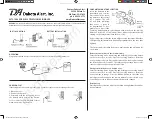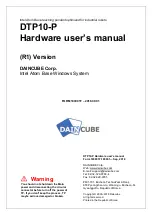
Issue 3.0
UNIVERGE SV8100
2 - 36
Features
Calling Party Number (CPN) Presentation from Station
SMDR Includes Dialed Number
Display Shows Why Caller ID is Not Available
K-CCIS – IP
The system uses the PZ-32IPLA, PZ-64IPLA or PZ-128IPLA daughter board to
connect multiple systems together over a Data Communication IP Network (Intranet).
Key-Common Channel Interoffice Signaling (KCCIS) provides telephony services
between the UNIVERGE SV8100 and another UNIVERGE SV8100 or a NEAX PBX
system.
CCIS Networking via IP (Non Peer-to-Peer Connections Basis).
IP trunk connections over CCIS Networking via IP provide telephony services
between the UNIVERGE SV8100, NEAX IPS, IPX, SV7000 and the UNIVERGE
SV8300.
The UNIVERGE SV8100 uses the NEC proprietary CCIS Peer to Peer protocol
over IP to communicate from system to system.
The PZ-(X)IPLA is required for connections between IP terminals and IP trunks.
Only one PZ-(X)IPLA daughter board can be accommodated per system with a
maximum of 128 DSP resources per system.
The PZ-(X)IPLA daughter board is an optional interface package for converting the
Real Time Transfer Protocol (RTP) packets on the IP network to PCM highway. IP
telephones must be connected directly to the IP bus. When IP telephones are
required to be connected to conventional PCM based digital circuit, the PZ-(X)IPLA
converts IP packet signals. The PZ-(X)IPLA provides the digital signal processors
(DSPs) for IP stations and trunks.
A DSP provides format conversion from circuit switched networks (TDM) to packet
switched networks (IP). Each voice channel from the circuit switched network is
compressed and packetized for transmission over the packet network. In the reverse
direction, each packet is buffered for de-jittering, decompressed, and sent to the
circuit switched network. Each DSP converts a single speech channel from IP to TDM
and vice versa.
K-CCIS – T1
Key-Common Channel Interoffice Signaling (K-CCIS) allows multiple systems to be
connected to provide additional feature compatibility, above what normal Tie Lines
provide. The system is configured with a 24 channel T1 Connection and CD-CCTA for
receiving or transmitting common signaling data from/to a distant office. The system
can provide a variety of interoffice service features such as Calling Name display,
Centralized Voice Mail Integration, or Link Reconnect.
The following features are provided:
Call Forwarding – All Calls – K-CCIS
Call Forwarding – Busy/No Answer – K-CCIS
Summary of Contents for UNIVERGE SV810
Page 2: ......
Page 3: ...General Description Manual INT 2069 UNIV ISSUE 3 0 Version 2500 ...
Page 4: ......
Page 6: ......
Page 20: ...Issue 3 0 UNIVERGE SV8100 R 12 Regulatory NOTES ...
Page 122: ...Issue 3 0 UNIVERGE SV8100 2 82 Features THIS PAGE INTENTIONALLY LEFT BLANK ...
Page 132: ...Issue 3 0 UNIVERGE SV8100 3 10 Equipment THIS PAGE INTENTIONALLY LEFT BLANK ...
Page 162: ...Issue 3 0 UNIVERGE SV8100 5 26 Hardware Specifications THIS PAGE INTENTIONALLY LEFT BLANK ...
Page 163: ......
Page 164: ...GENERAL DESCRIPTION MANUAL NEC Unified Solutions Inc Issue 3 0 Version 2500 ...
















































